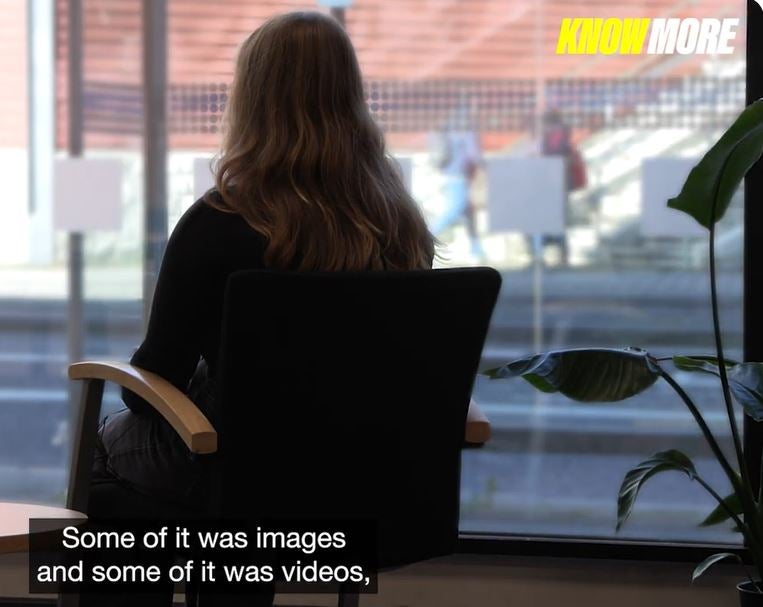
“It was definitely targeted at me. Because I am a journalist and because I’m a woman.”
These words, spoken on a new campaign video issued today (Monday November 25) by South Yorkshire Police (SYP), will resonate with hundreds of women working in our industry who have been faced with online violence simply because of their gender and the job they do.
In this specific instance, a journalist for Reach, the UK’s largest commercial publisher, was sent unsolicited extreme pornographic content without her consent. The images, videos and gifs were paired with vile misogynistic language and appeared to have been sent with the intention of intimidation and sexual gratification. Such activities are now classed as criminal under the Online Safety Act, which came into force just over a year ago.
The Know More campaign, launched to coincide with International Day for the Elimination of Violence Against Women tackles the issue of Online Violence Against Women and Girls (VAWG), with the intent of not only educating the public around the impact and criminality of offences such as cyber stalking, threats and cyberflashing, but also with the intent to arm its officers with knowledge around application of the law through training and resources.
Earlier this year SYP approached me to ask for input from Reach into the issues faced by women working in journalism. Their campaign officers had seen the research we published in conjunction with Women in Journalism in 2023 which showed three-quarters of women had experienced some kind of threat to their safety in connection to their work as journalists and that 25 per cent had been subjected to sexual violence or harassment. Half of the respondents said they promoted their work less due to the threat of online harm and a fifth of the respondents said they had considered leaving journalism altogether.
The SYP campaign seeks to acknowledge the increased levels of online violence targeting women in public-facing roles such as journalists and politicians and they asked if we might be able to support by providing testimonies and guidance that could be shared with police officers and in the public campaign.
This push to highlight the criminal impact and potential police response to online violence of this nature should be lauded.
This year more than 100 media leaders signed a letter co-authored by Reach, Women in Journalism and Reporters Without Borders, which called for improved police response to online crimes against women in media industries and improved working relations between journalism and policing.
A month later, the Crime Reporters Association (CRA), the Society of Editors and the Media Lawyers Association issued a report and a series of recommendations setting out improvements that could be made to repair the relationship between police and journalism in the UK and improve the safety of journalists.
That’s why the SYP campaign has to be spotlighted and celebrated.
To see South Yorkshire Police taking such an active stance on online crime that particularly impacts women, was refreshing and I intend to highlight their work as a bastion of best practice when talking to police leaders and representatives in government who are working to address violence against journalists and VAWG.
Our journalist who bravely shared her story is sadly one of many women who I know have been targeted by unjustifiable and revolting aggression and sent extreme adult content without consent. I applaud her too for highlighting the impact such actions can have and for standing up and refusing to allow such shameful and criminal abuse to stop her from doing her job.
However, what we now need to see is similar activity from other police forces and a joined-up approach to tackling the impact and potential consequences of online violence against women and girls. We also need to see investment and support for police to act upon the laws they have at their disposal and ultimately bring perpetrators of violent online crimes to justice.
Unfortunately in our reporter’s case, while police on her local force (not South Yorkshire) investigated, they were unable to gather enough evidence to identify the perpetrator due to the use of a VPN (Virtual Private Network) and because the crime was not considered to reach the threshold of threat into which further investigation was warranted.
This outcome is not unusual. Currently prosecution of anonymous online crime of this nature is low, often due to difficulties in gathering evidence.
Therefore, the important next steps have to include more collaborative work like that done by SYP. There also has to be more engagement in the issues beset by journalists and women who use online spaces for their work and there has to be greater investment in policing and resources.
Without these elements being put into place, we run the risk of the law being toothless, resulting in perpetrators continuing to escape prosecution for their crimes and potentially going on to commit more serious violence against women and girls.
Email pged@pressgazette.co.uk to point out mistakes, provide story tips or send in a letter for publication on our "Letters Page" blog
